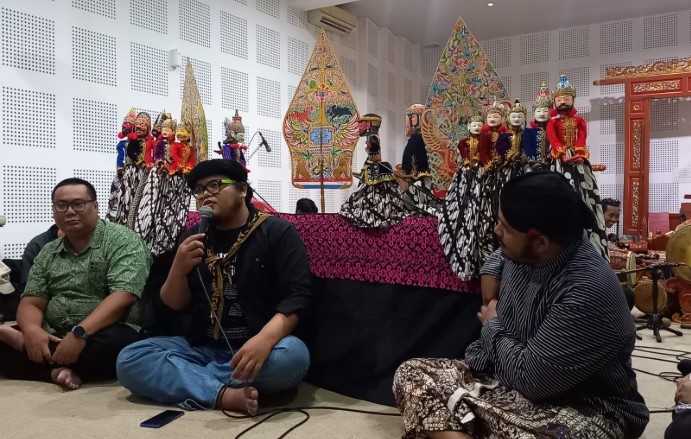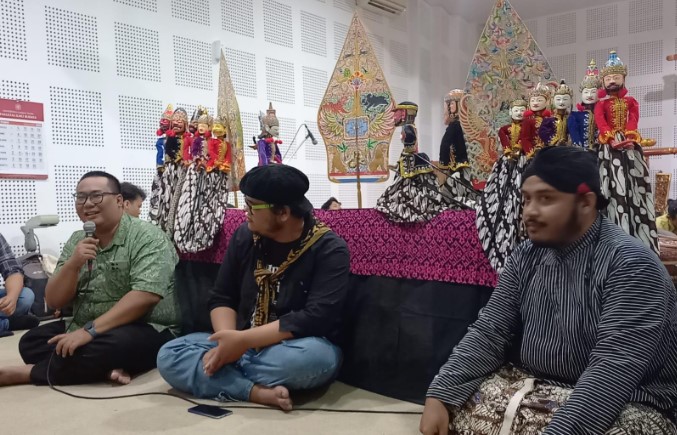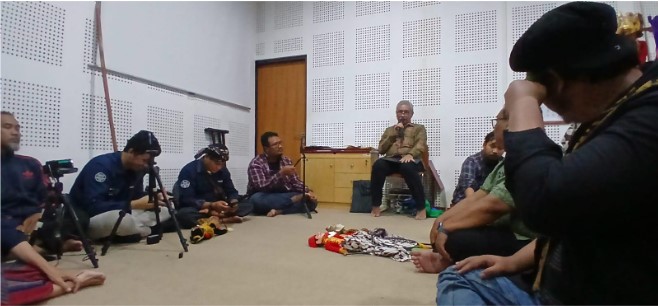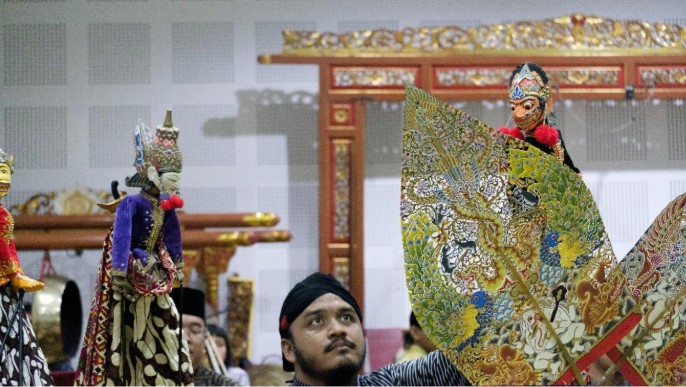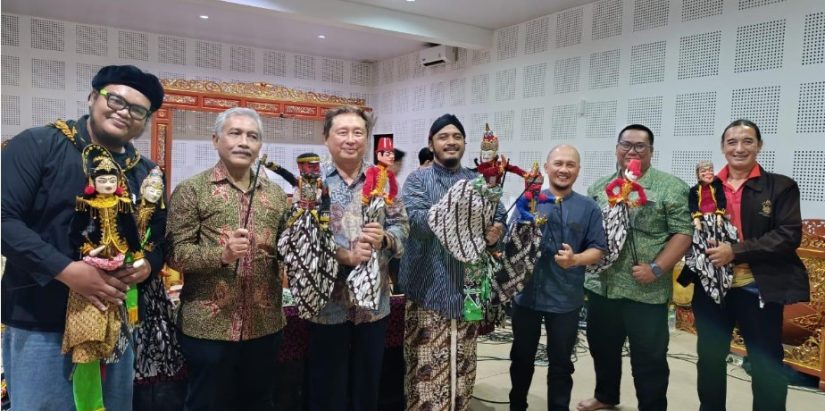
Yogyakarta, November 29, 2025 — The Department of Javanese Language, Literature, and Culture, Faculty of Cultural Sciences, Gadjah Mada University (FIB UGM), held an event titled “Dari Kertas Naik ke Pentas: Workshop Alih Wahana Epos Jawa-Islam dari Teks Sastra ke Lakon Pertunjukan” [From Paper to Stage: Workshop on Adapting Javanese-Islamic Epics from Literary Texts to Performance Play] in the Gamelan Room, Margono Building, 4th floor of FIB UGM. This public event attracted participants from various backgrounds, including students, academics, arts and culture enthusiasts, and the general public.
This workshop served as a cross-disciplinary discussion forum that combined perspectives from literature, history, and performing arts, particularly in the context of Menak puppet theater, a cultural heritage that represents a fusion of Islamic values, Javanese traditions, and puppet theater arts. Three speakers were present at this event, namely Dr. Drs. Sudibyo, M.Hum. (Head of the Department of Language and Literature, FIB UGM), Kusnanta Riwus Ginanjar, S.Sn. (actor, scriptwriter, director, and Menak puppet show puppeteer), and Rinal Khaidar Ali, ST., M.Eng. (Menak puppet show activist). The event was moderated by Dr. Rudy Wiratama, S.I.P., M.A., lecturer at the Javanese Language, Literature, and Culture Study Program.
The first presentation was delivered by Kusnanta Riwus Ginanjar, S.Sn. He discussed the existence of Menak puppet theater from an artistic perspective and its function as a learning medium. In addition, Kusnanta emphasized the importance of adapting classical literary works so that they do not remain merely as written texts. This is done so that these works can continue to be preserved and known to the wider community.
The second speaker, Rinal Khaidar Ali, ST., M.Eng., highlighted the current condition of Menak puppet theater in Indonesia, particularly in the Java region. He said that its existence is currently in decline. “There are no longer any Menak puppet craftsmen in Yogyakarta, located in the Sentolo area. Even in Kebumen, their numbers are dwindling,” he explained.
The third session was presented by Dr. Sudibyo, M.Hum., who discussed the historical dimensions of the Menak story. He explained that the Menak epic originated in Persia based on the heroic story of Amir Hamzah bin Abdul Muthalib, the uncle of the Prophet Muhammad. The story then spread to the Arab and Malay worlds before finally being adapted into Javanese culture. Later, during the Mataram Kartasura Sultanate, this story was rewritten in Javanese by carik Narawita and then updated by the poet Yasadipura. According to him, this adaptation process was not merely a translation, but also a creative form of cultural contextualization with the addition of interludes.
To conclude, this event featured a Menak golek puppet show entitled “Menak Iskandar” by Dr. Rudy Wiratama, S.I.P., M.A. The story is sourced from Serat Iskandar Jawi or Caritanira Iskandar, which was composed at the Kartasura Palace in 1729 AD by order of Kangjeng Ratu Mas Balitar, the queen consort of Pakubuwana I.
The story tells of the journey of Prabu Iskandar Zulkarnain, King of Ngerum, in his efforts to conquer the eastern and western worlds in order to spread the teachings of the Prophet Ibrahim. However, his struggle was hindered by King Ubur of Jabarsah and the army of giant worshippers Ya’juj and Ma’juj. Based on the advice of Prophet Kilir, Iskandar built a great wall that enclosed Ja-Makjuja until the end of time. Nevertheless, Iskandar was still worried that Ja-Makjuja would escape one day. He asked Prophet Kilir for the elixir of life. Prophet Kilir then departed for the land of Lulmat in the country of Jaminambar, where a lake called Ma’ul Hayat was located. Next, Prophet Kilir drank the water, performed ablution, and prayed at the edge of the lake. After finishing his prayers, by God’s will, Prophet Kilir gained immortality without having the chance to give the water to Iskandar. Iskandar, who was waiting for Prophet Kilir at the cave entrance, then realized that no power is eternal except that of Allah. He returned to the kingdom of Ngerum with his entire army.
This workshop is a tangible manifestation of academic and cultural efforts to revive Menak puppet theater as a literary and performing arts heritage in Indonesia. Through this activity, it is hoped that cross-disciplinary awareness can be built regarding the importance of preserving traditions while developing new forms that are relevant to the present day. Furthermore, the synergy between academics, artists, and the community is expected to continue to be encouraged so that Menak puppet theater art and literature remain a source of inspiration, cultural identity, and a living educational tool within the community.
Author : Haryo Untoro
Editor : Haryo Untoro

